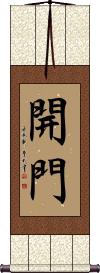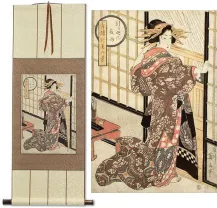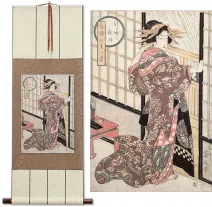Many custom options...
And formats...

Open Door in Chinese / Japanese...
Buy an Open Door calligraphy wall scroll here!
Open Door
開門 means “to open a door,” “opening gate” or figuratively, “to open for business.”
This in-stock artwork might be what you are looking for, and ships right away...
Gallery Price: $60.00
Your Price: $36.88
Gallery Price: $108.00
Your Price: $59.88
Gallery Price: $108.00
Your Price: $59.88
Not the results for Open Door that you were looking for?
Below are some entries from our dictionary that may match your Open Door search...
| Characters If shown, 2nd row is Simp. Chinese |
Pronunciation Romanization |
Simple Dictionary Definition |
地獄 地狱 see styles |
dì yù di4 yu4 ti yü jigoku じごく |
More info & calligraphy: Hell(1) {Buddh} hell realm; Naraka; (2) {Christn} Hell; (3) hell; misery; nightmare; inferno; (4) place where a volcano or hot springs constantly spew smoke or steam; (place-name) Jigoku naraka, 捺落迦 (or 那落迦) ; niraya 泥犂; explained by 不樂 joyless; 可厭 disgusting, hateful; 苦具, 苦器 means of suffering; if 地獄 earth-prison; 冥府 the shades, or departments of darkness. Earth-prison is generally intp. as hell or the hells; it may also be termed purgatory; one of the six gati or ways of transmigration. The hells are divided into three classes: I. Central, or radical, 根本地獄 consisting of (1) The eight hot hells. These were the original hells of primitive Buddhism, and are supposed to be located umder the southern continent Jambudvīpa 瞻部州, 500 yojanas below the surface. (a) 等活 or 更活 Saṃjīva, rebirth, where after many kinds of suffering a cold wind blows over the soul and returns it to this life as it was before, hence the name 等活. (b) 黑繩 Kaslasūtra, where the sufferer is bound with black chains and chopped or sawn asunder. (c) 線合; 衆合; 堆壓 Saṃghāta, where are multitudes of implements of torture, or the falling of mountains upon the sufferer. (d) 號呌; 呼呼; 叫喚 Raurava, hell of wailing. (e) 大呌; 大號呌; 大呼 Mahāraurava, hell of great wailing. (f) 炎熱; 燒炙 Tapana, hell of fames and burning. (g) 大熱; 大燒炙; 大炎熱 Pratāpana, hell of molten lead. (h) 無間; 河鼻旨; 阿惟越致; 阿毗至; 阿鼻; 阿毗 Avīci, unintermitted suffering, where sinners die and are reborn to suffer without interval. (2) The eight cold hells 八寒地獄. (a) 頞浮陀地獄 Arbuda, where the cold causes blisters. (b) 尼刺部陀 Nirarbuda, colder still causing the blisters to burst. (c) 頞哳吒; 阿吒吒 Atata, where this is the only possible sound from frozen lips. (d) 臛臛婆; 阿波波 Hahava or Apapa, where it is so cold that only this sound can be uttered. (e) 虎虎婆 Hāhādhara or Huhuva, where only this sound can be uttered. (f) 嗢鉢羅; 鬱鉢羅 (or 優鉢羅) Utpala, or 尼羅鳥 (or 漚) 鉢羅 Nīlotpala, where the skin is frozen like blue lotus buds. (g) 鉢特摩 Padma, where the skin is frozen and bursts open like red lotus buds. (h) 摩訶鉢特摩 Mahāpadma, ditto like great red lotus buds. Somewhat different names are also given. Cf. 倶舍論 8; 智度論 16; 涅槃經 11. II. The secondary hells are called 近邊地獄 adjacent hells or 十六遊增 each of its four sides, opening from each such door are four adjacent hells, in all sixteen; thus with the original eight there are 136. A list of eighteen hells is given in the 十八泥梨經. III. A third class is called the 孤地獄 (獨地獄) Lokāntarika, or isolated hells in mountains, deserts, below the earth and above it. Eitel says in regard to the eight hot hells that they range 'one beneath the other in tiers which begin at a depth of 11,900 yojanas and reach to a depth of 40,000 yojanas'. The cold hells are under 'the two Tchahavālas and range shaft-like one below the other, but so that this shaft is gradually widening to the fourth hell and then narrowing itself again so that the first and last hell have the shortest, those in the centre the longest diameter'. 'Every universe has the same number of hells, ' but 'the northern continent has no hell whatever, the two continents east and west of Meru have only small Lokāntarika hells... whilst all the other hells are required for the inhabitants of the southern continent '. It may be noted that the purpose of these hells is definitely punitive, as well as purgatorial. Yama is the judge and ruler, assisted by eighteen officers and a host of demons, who order or administer the various degrees of torture. 'His sister performs the same duties with regard to female criminals, ' and it may be mentioned that the Chinese have added the 血盆池 Lake of the bloody bath, or 'placenta tank' for women who die in childbirth. Release from the hells is in the power of the monks by tantric means. |
開門 开门 see styles |
kāi mén kai1 men2 k`ai men kai men kaimon かいもん |
More info & calligraphy: Open Door(n,vs,vi) opening gate opens the gate |
闢 辟 see styles |
pì pi4 p`i pi hyaku |
to open (a door); to open up (for development); to dispel; to refute; to repudiate; (bound form) penetrating; incisive To open; translit. pi, v. 毘. |
敲開 敲开 see styles |
qiāo kāi qiao1 kai1 ch`iao k`ai chiao kai |
to get something open by tapping or striking it; (figuratively, when followed by something like ∼的大門|∼的大门[xx5 de5 da4 men2]) to open the door to ~; to gain access to ~ |
普門 普门 see styles |
pǔ mén pu3 men2 p`u men pu men fumon ふもん |
(surname) Fumon Universal door, the opening into all things, or universality; the universe in anything; the unlimited doors open to a Buddha, or bodhisattva, and the forms in which he can reveal himself. |
破門 破门 see styles |
pò mén po4 men2 p`o men po men hamon はもん |
to burst or force open a door; to excommunicate sb (from the Roman Catholic Church); to score a goal (in football, hockey etc) (noun, transitive verb) (1) expulsion (of a pupil); (noun, transitive verb) (2) excommunication; anathema To break a door, leave a sect. |
虛掩 虚掩 see styles |
xū yǎn xu1 yan3 hsü yen |
to partially obscure; (of a door, gate or window) slightly open; ajar; not fully shut; unlocked; (of a jacket or shirt) unbuttoned |
開放 开放 see styles |
kāi fàng kai1 fang4 k`ai fang kai fang kaihou / kaiho かいほう |
to bloom; to open; to be open (to the public); to open up (to the outside); to be open-minded; unrestrained by convention; unconstrained in one's sexuality (noun, transitive verb) (1) opening (a door, window, etc.); leaving open; (noun, transitive verb) (2) opening up (e.g. to the public); allowing (public) access |
からり see styles |
karari からり |
(adv-to,adv) (1) (onomatopoeic or mimetic word) with a clatter; (adv-to,adv) (2) (onomatopoeic or mimetic word) with a fling (opening a door, window, etc.); (adv-to,adv) (3) (onomatopoeic or mimetic word) bright and clear (weather, sky, etc.); perfectly (fine weather); (adv-to,adv) (4) (onomatopoeic or mimetic word) nicely dry (laundry, air, etc.); crisply (fried, cooked, etc.); (adv-to,adv) (5) (onomatopoeic or mimetic word) cheerfully; frankly; open-heartedly; (adv-to,adv) (6) (onomatopoeic or mimetic word) completely (forget, change, etc.); totally |
半開門 半开门 see styles |
bàn kāi mén ban4 kai1 men2 pan k`ai men pan kai men |
half-open door; fig. prostitute |
蹴放す see styles |
kehanasu けはなす |
(transitive verb) (1) (archaism) to kick free; to kick loose; to kick away; (transitive verb) (2) (archaism) to kick open (e.g. a sliding door) |
蹴破る see styles |
keyaburu けやぶる |
(transitive verb) (1) to break (by kicking); to kick down (e.g. a door); to kick open; to break down; to break open; (transitive verb) (2) (idiom) to smash through (e.g. the enemy); to rout |
開後門 开后门 see styles |
kāi hòu mén kai1 hou4 men2 k`ai hou men kai hou men |
to open the back door; fig. under the counter; to do a secret or dishonest deal; to let something in by the back door |
開門砲 开门炮 see styles |
kāi mén pào kai1 men2 pao4 k`ai men p`ao kai men pao |
firecrackers to open the door on the New Year |
戸を破る see styles |
tooyaburu とをやぶる |
(exp,v5r) to bust down a door; to break a door open |
門戶開放 门户开放 see styles |
mén hù kāi fàng men2 hu4 kai1 fang4 men hu k`ai fang men hu kai fang |
open door policy; Egyptian President Sadat's infitah policy towards investment and relations with Israel |
門戸開放 see styles |
monkokaihou / monkokaiho もんこかいほう |
(noun - becomes adjective with の) (yoji) open door policy |
開甘露門 开甘露门 see styles |
kāi gān lù mén kai1 gan1 lu4 men2 k`ai kan lu men kai kan lu men kai kanro mon |
To open the ambrosial door, i.e. provide for hungry ghosts. |
開門揖盜 开门揖盗 see styles |
kāi mén yī dào kai1 men2 yi1 dao4 k`ai men i tao kai men i tao |
leaving the door open invites the thief (idiom); to invite disaster by giving evildoers a free hand |
開門見山 开门见山 see styles |
kāi mén jiàn shān kai1 men2 jian4 shan1 k`ai men chien shan kai men chien shan |
lit. to open the door and see the mountain; fig. to get right to the point (idiom) |
天安門開了 天安门开了 see styles |
tiān ān mén kāi le tian1 an1 men2 kai1 le5 t`ien an men k`ai le tien an men kai le |
pants fly is down; the barn door is open |
戸を開ける see styles |
tooakeru とをあける |
(exp,v1) to open the door |
道が開ける see styles |
michigahirakeru みちがひらける |
(exp,v1) (idiom) to open a pathway (to); to find a way (to); to open the door (to); to pave the way (for) |
門戸を開く see styles |
monkoohiraku もんこをひらく |
(exp,v5k) to open the door (to the world, women, etc.) |
オープンドア see styles |
oopundoa オープンドア |
open door |
ドアハンドル see styles |
doahandoru ドアハンドル |
door handle (usu. D-shaped handle for pulling open doors); doorhandle |
門戸開放政策 see styles |
monkokaihouseisaku / monkokaihosesaku もんこかいほうせいさく |
open door policy |
オープン・ドア see styles |
oopun doa オープン・ドア |
open door |
Variations: |
garari; garari ガラリ; がらり |
(adv,adv-to) (1) (onomatopoeic or mimetic word) (opening a door) with a clatter; noisily; flinging (open); forcefully; (adv,adv-to) (2) (onomatopoeic or mimetic word) (falling) with a clatter; with a crash; (adv,adv-to) (3) (onomatopoeic or mimetic word) (changing) completely; totally; utterly; dramatically; suddenly; (4) louvre window; louvre door |
ドア・ハンドル see styles |
doa handoru ドア・ハンドル |
door handle (usu. D-shaped handle for pulling open doors); doorhandle |
Click here for more Open Door results from our dictionary
The following table may be helpful for those studying Chinese or Japanese...
| Title | Characters | Romaji (Romanized Japanese) | Various forms of Romanized Chinese | |
| Open Door | 開門 开门 | kai mon / kaimon | kāi mén / kai1 men2 / kai men / kaimen | k`ai men / kaimen / kai men |
| In some entries above you will see that characters have different versions above and below a line. In these cases, the characters above the line are Traditional Chinese, while the ones below are Simplified Chinese. | ||||
Successful Chinese Character and Japanese Kanji calligraphy searches within the last few hours...







